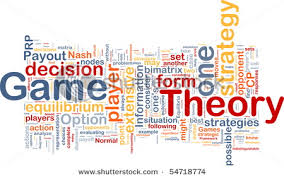Game theory is the scientific study of conflict and cooperation between two or more intelligent decision makers. Concepts of game theory apply to those situations where individual’s actions are independent form what others does. It is assumed that information is known to all the individuals. Game theory provides a platform to plan, model, analyze and understand strategic scenarios. The consistency and strong mathematical foundations of game theory makes it an important tool for modelling and decision making in automated interactive environments.
Game theory enables a decision-maker to analyze all the players and their strategic options and helps him consider their preferences and reactions in the process of decision making. Major assumption in game theory is that the players are rational. A rational individual is one who always chooses an action whose outcome is in his best interest, given he has information about other players’ actions.
Dominant strategy can be defined as that strategy which is expected to give the best possible outcome for any action taken by the opponents. A strategy which cannot give the preferred outcome for at least one strategy of the opponents is called as dominated strategy. Any rational player would choose a dominant strategy.
Game theory can be broadly classified into two categories. They are:
- Cooperative game theory
- Non-cooperative game theory
Cooperative game theory: This specifies only what payoffs each player would get by cooperation of its members. The process by which the cooperation is achieved is not specified. Nash equilibrium comes in the framework of cooperative game theory. Nash demonstrated that any finite game will always have an equilibrium point, at which each player chooses actions which give them the best results given opponents’ choices.
Non-cooperative game theory: This is concerned about analyzing the available strategic choices. In this model, details of the ordering and timing of players’ choices are important in determining the result of the game. In this model players are assumed to make decisions out of their own interest. Cooperation can at times occur in this model if an outcome appears to be in everyone’s best interests.
Non-cooperative game theory can be represented broadly in two forms. They are:
- Strategic from
- Extensive form
Strategic from: This is a basic type of representing non-cooperative game theory. This representation is also called as game matrix. This will list each player’s strategies and the outcome of each possible combination of strategies. Outcomes represented by payoffs for each player. Payoff can be simply defined as indicator of a player’s willingness to choose a strategy, given other players’ choices.
Extensive form: This representation is widely known as game tree. It is more detailed than strategic form including complete description about the way the game is played over the time. This model will take into consideration even the order in which various players act. Any game in extensive form can be analyzed directly or can be converted into equivalent strategic form.





28 Comments. Leave new
Very well explained.
well explained
Game theory is the mandate thing for strategic decision making.
Game theory fascinates me a lot.
http://vskills.in/certification/blog/nash-equilibrium-and-sports-go-hand-in-hand/
The above link is an article of mine based on application of Nash equilibrium, which is associated with game theory. Hope you like reading it, Vinay.
Thanks for Sharing it Akul Dev Saha
Game theory has always fascinated me.
http://vskills.in/certification/blog/nash-equilibrium-and-sports-go-hand-in-hand/
This is an article on application of nash equilibrium, an associated topic in game theory. Hope you like it.
Game theory fascinates me a lot.
http://vskills.in/certification/blog/nash-equilibrium-and-sports-go-hand-in-hand/
This is an article on application of Nash equilibrium, a related topic to game theory. Hope you like reading it.
http://vskills.in/certification/blog/nash-equilibrium-and-sports-go-hand-in-hand/
Hope you like reading this article. Its something on Nash equilibrium, a topic related to game theory.
Nicely explained. Game theory has emerged to be one of the best plan of action one can take to judge the reactions of the rival firms. But is this theory best suitable for all the market forms or just oligopoly?
Well explained
nice work!!!
Good work ! Game theory has a special part in economics and the economy works around it. For companies to overtake its rivals, its important to take care of strategies of both, ours and theirs.
nice one …wonderful post .liked it
According to me, Games theory has been a success in the application of decision making of two people. It has been wonderfully explained and very informative. In this theory, all kinds of strategies are covered and it becomes beneficial for the decision maker to take care of strategies of both, ours and theirs.
Game theory is my one of the favourate theories. I enjoyed reading yours.
Intresting read!!!
very informative
Game theory without Nash equilibrium?
Intresting read..Thanks for the Info!
very informative article!
nice post.enjoyed reading it
You really broadened my horizon relating to the dominant strategy!We also have nash equilibrium,though dominant equilibrium is a subset of it!
Thank you:)
Nice work!
Informative:)
good one 🙂
Had no idea about all of this dominant, extensive etc. very informative 🙂
Artificial Intelligence and Alternate Reality is booming in the gaming industry 🙂